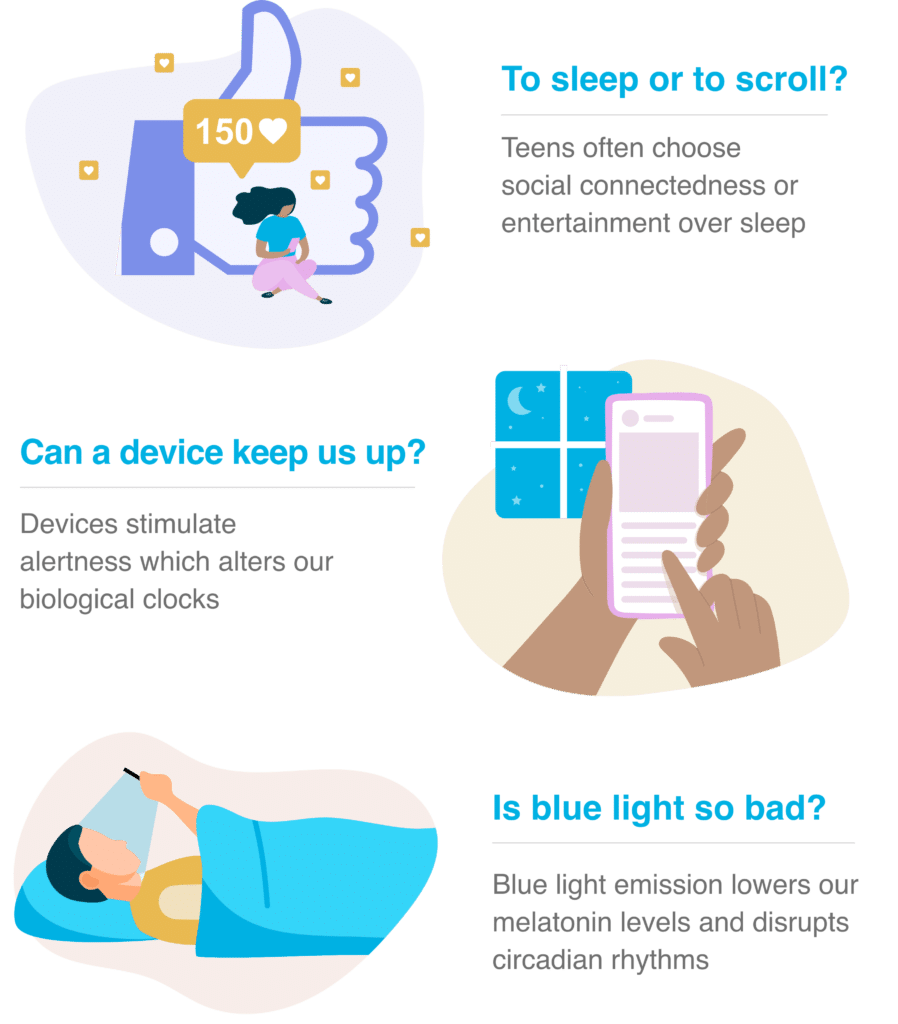Recommended Sleep for Teens

Experts recommend that children 6–12 years old get an average of 9–12 hours of sleep, and teenagers 13–18 years old should get 8–10 hours (Centers, 2020). Unfortunately, most kids aren’t catching that many Zzzs.
Studies show that at least 50%—and perhaps as many as 90%—of school-aged children and adolescents are not getting the recommended amount of sleep.
(LeBourgeois et al., 2017, p. S93)
Studies show that at least 50%—and perhaps as many as 90%—of school-aged children and adolescents are not getting the recommended amount of sleep. With 60% of adolescents spending time on screens at least an hour before bedtime, experts suggest the widespread use of digital media contributes to this trend (LeBourgeois et al., 2017, p. S93).
Screens and Sleep Deprivation: 3 Reasons Why Your Kid Is Losing Sleep
Engaging with digital media, especially during the hour leading up to bedtime, negatively affects sleep quantity and quality. It helps to understand why kids force themselves to stay up and how devices postpone and disrupt sleep (LeBourgeois et al., 2017, p. S93):

The Phone Temptation
Staying off your phone before bed does not eliminate the danger. Simply keeping a phone in the bedroom poses a risk and can create sleep disturbances (Reid Chassiakos et al., 2016, p. e8). It’s very common to pick up our phones to quickly check notifications, which can easily turn into a few hours of mindless scrolling.
Furthermore, reaching for our phones when we wake up, especially in the middle of the night, disrupts our ability to fall back asleep. These sleep disturbances result in longer sleep latency (the time it takes to fall asleep), less sleep, and lower quality sleep. We can see why teens feel tired, irritable, and moody the next day (Reid Chassiakos et al., 2016, p. e8; LeBourgeois et al., 2017, s95).
In a recent systematic review of 67 studies of screen time and media use in school-aged youth and teenagers . . . 90% found that screen time was adversely associated with sleep health, primarily via delayed bedtimes and reduced sleep duration.
—Dr. Monique K. LeBourgeois, Associate Professor of Integrative Physiology, University of Colorado Boulder
Problems From Too Little Sleep
Inadequate sleep is associated with a host of negative consequences, including (Council, 2016, p. 2; Gavin, 2021; LeBourgeois et al., 2017, p. S95; Vazsonyi et al., 2021, p. 1018):
- higher risks of obesity
- decreased mental health
- lower energy (both physical and mental)
- suppression of teenage growth spurts
- increase in risky behaviors
- Incidence of drowsy driving, diminished performance in extracurricular activities, and exacerbating sleep disorders
Poor sleep can also lead to poor academic performance (Council, 2016, p. 2). Even something as simple as increased moodiness might have less to do with your teen “just being a teen” and more to do with a lack of adequate sleep (LeBourgeois et al., 2017, p. S95).
Tips to Increase Teenagers’ Sleep
- Put on your lab coat and have a scientific discussion about melatonin production and circadian rhythms
- Watch this clever and funny video of a young man’s decision to put away his phone one hour before bedtime
- Have a talk about this article, which explains what checking your phone first thing in the morning does to your brain
Kids are smart. Appealing to reason can help them make better decisions regarding devices and bedtime.
References
- Centers for Disease Control and Prevention. (2020, September 10). Sleep in middle and high school students. CDC Healthy Schools. Retrieved February 11, 2022, from https://www.cdc.gov/healthyschools/features/students-sleep.htm#:~: text=How%20much%20sleep%20someone%20needs,10%20hours%20per%2024%20hours
- Council on Communications and Media. (2016). Media use in school-aged children and adolescents. American Academy of Pediatrics. Pediatrics, 138(5), 1-6. E20162592
- Gavin, M. L. (2021). Can lack of sleep stunt your growth? Nemours Teen Health. Retrieved February 11, 2022, from https://kidshealth.org/en/teens/sleep-growth.html
- LeBourgeois, M. K., Hale, L., Chang, A.-M., Akacem, L. D., Montgomery-Downs, H. E., & Buxton, O. M. (2017). Digital media and sleep in childhood and adolescence. Pediatrics, 140(5, Supp 2), S92–S96
- Reid Chassiakos, Y. L., Radesky, J., Christakis, D., Moreno, M. A., & Cross, C. (2016). Children and adolescents and digital media. Pediatrics 138(5), e1-e18. e20162593
- Vazsonyi, A. T., Liu, D., Javakhishvili, M., Beier, J. J., & Blatny, M. (2021). Sleepless: The developmental significance of sleep quality and quantity among adolescents. Developmental Psychology, 57(6), 1018-1024
- WebMD. (n.d.). Melatonin - uses, side effects, and more. Retrieved February 11, 2022, from https://www.webmd.com/vitamins/ai/ingredientmono-940/melatonin








Success!
Your comment has been submitted for review! We will notify you when it has been approved and posted!
Thank you!